When I was in high school and college, music was my thing. I took four years of voice lessons, sang in and served as the student leader of three choirs in high school, two in college, and sang in two during the three years of residency at the Seminary. I occasionally sang solos and earned a few dollars singing at weddings during the early years. Once, I was asked to perform at a formal evening event toward the end of my college years. I sang “My Favorite Things” from The Sound of Music. I want to say that my performance was sensational, but it was not. I realized that I didn’t have a solo performance voice. It wasn’t strong or lovely enough, nor was I animated and expressive enough to connect with the audience. In the following years, I accepted that while I was skilled in reading music and had a natural ability to sing on pitch, my voice was more fitting to ensembles and choirs than solo performances. The timbre of my voice did serve well in chanting, both in a chant choir and solo chanting. It was not easy to accept my encounter with reality, but reality was a healthier location to be than fantasy.
The lyrics of the refrain of “My Favorite Things” are:
When the dog bites
When the bee stings
When I'm feeling sad
I simply remember my favorite things
And then I don't feel so bad
Charlie & Marlene Fritz, Gary & Chara Koeneman, John & Carol Yoss
Peter & Mary Ann Tremain
I am feeling sad. After we arrived in the Kansas City area in 1972, Mary Ann and I became part of a group of four couples that watched our kids grow up together for fifteen years. Even though we moved out of state, we stayed close and occasionally vacationed together. They felt like extended family for the following decades.
Mary Ann was the first of us to leave, fifteen years ago, due to complications of Parkinson’s. A couple of years later, Marlene died of a form of ALS. Early last year, Gary died, followed a couple of months later by Charlie. A few days ago, Carol died. John, Chara, and I are left.
My sadness is mostly for Carol’s husband, John. They were married for sixty years. He had grown up with Charlie and Gary, his best friends. John and Carol lost their son Scotty in an accident when he was three years old. The size and weight of John’s grief are beyond comprehension. Grief accumulates, the next one reviving all the griefs that have gone before it. Surviving is a choice. Grief never goes away, but it can morph into something that adds fuel to the will and the ability to grow. Right now, John can barely breathe. It is far too soon to contemplate any sort of growth. Daily survival is the first order of business, doing immediate tasks, no big decisions yet.
In this context, the song and its refrain sounds stupid, even cruel, with its cliche “be happy” message. Life brings more than bee stings and dog bites and a bit of sadness. There are times when what has come is too big to fix, when there is nothing that weighs enough to equal or exceed the mass of the sadness or sting or bite or loss. Trying to pretend it hasn’t happened is an exercise in futility. All that is left to do is to give up trying to undo what has happened. That does not mean giving up on life – just the opposite, choosing to live.
The song came to my mind when I was feeling a bit down, and my mood was lifted by some little things that brought me joy even though they were too small to justify. Carol’s death started me thinking about things that brought joy into the time our group of eight did things together. Those things have not left. They remain a part not only of the past but of the present and the future. They don’t need to weigh as much as the loss. Nothing can fill the void. Give up trying to fill it. Nothing can change whatever it is that has stung us or bitten us or stolen our joy. When remembering the simple, favorite things, you determine how much they weigh. They have no weight that can be measured by an external means, just as the bad things that happen have no weight that can be measured.
I have been with many families, gathering them together to talk about the one they have loved and lost. The pain was palpable; the sadness, the grief, and tears flowed. Even when the circumstances were tragic, stories, memories, bits and pieces of who the one who has died was during their life would almost always include some that triggered laughter through the tears. The life of that person would break into the present. They were not gone. For a moment, the laughter would break the power of the pain. It weighed enough to accomplish that.
I remember some of the times the eight of us experienced joy together. Six of us were able to book discounted cabins on a cruise to the Bahamas around the time of our twenty-fifth wedding anniversaries. We took a side excursion to a nude beach, all looking around us on that small boat, praying fervently that no one would take their clothes off. Gratefully, no one did, but we did take pictures of a couple of us guys standing behind a strategically located bush, creating the illusion we were nude.
All four couples and our elementary school-aged kid boarded a sleeper bus to Colorado as part of a church-sponsored ski trip. On the way back, during a snowstorm, our bus started sliding past cars on either side of us until it slowly spun around and finally came to rest on the guard rail that kept us from rolling down the side of the mountain. Time stopped while we were turning around in slow motion. That shared experience drew us closer together.
I remember my surprise 50th birthday party arranged by that group. By then, Mary Ann and I had moved from KC to a parish in the Oklahoma City area. I can’t remember how Mary Ann managed to get me there without any idea of what awaited. I returned to OKC with two canes, each with a little horn attached, and multiple containers of over-the-counter laxatives.
We vacationed together one year in New Braunfels, Texas. We drove to a beer garden in nearby Grüne, Texas, for dinner. Mary Ann wasn’t feeling up to coming along. She had been diagnosed with Parkinson's disease a few years earlier but had insisted that the kids and I tell no one, even our respective parents and siblings. Mary Ann finally permitted me to reveal the diagnosis to the group. They were a constant source of support for us, helping out in whatever way they could. After we moved to Topeka, an hour away from KC, they drove over and helped us remodel our house to make it accessible to the wheelchair.
Our absolute favorite memory occurred when all four couples traveled to Alaska and, after driving up to Denali for a night, returned to Anchorage to take a bus to Seward, where we boarded the ship. By that time, Mary Ann’s Parkinson’s had progressed, and Marlene’s form of ALS had also progressed enough to have mobility issues. That did not stop us! The scenery was stunning, and we were enthralled by the drama of so much of what we saw. We took a side trip to Talkeetna, where there is a massive statue of a standing grizzly bear. There was something about the bear’s stance that caught our eye. The guys all looked at each other and knew immediately what to do next. We lined up, two on each side, facing the same direction the bear was facing. We spread our legs a bit and put our hands together in front. Our four wives kept trying to get a picture of us from the back, but they were laughing so hard it took them a long time to actually take the picture. The four of us guys were also laughing so hard it hurt.
There are other joyful and poignant memories in our lives together that are alive and well, offering moments that ease the pain and provide a bit of perspective. Death defines and magnifies the wonder of life. It doesn’t cause it to cease, it brings into focus favorite things to remember and celebrate.
- Peter




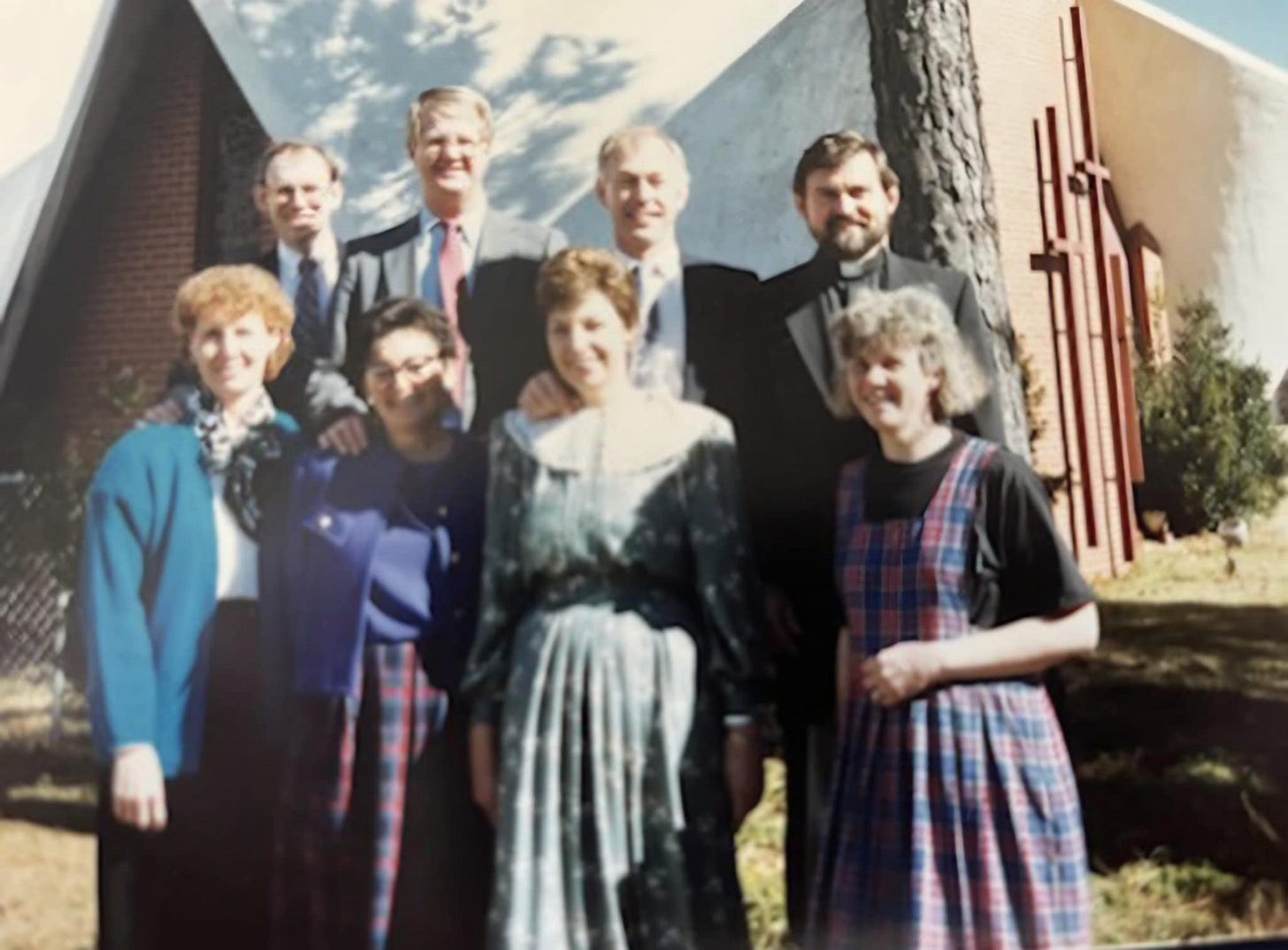
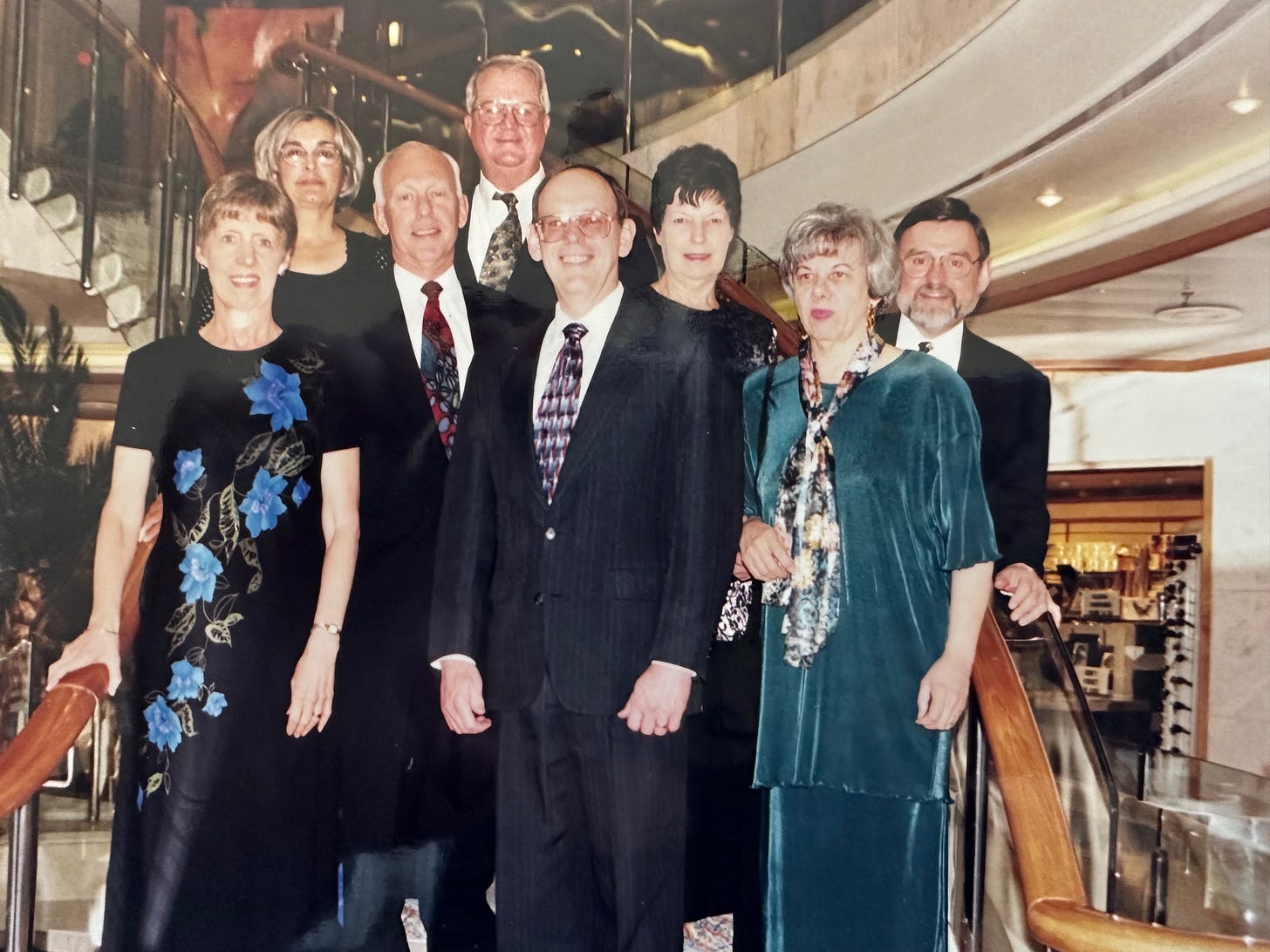
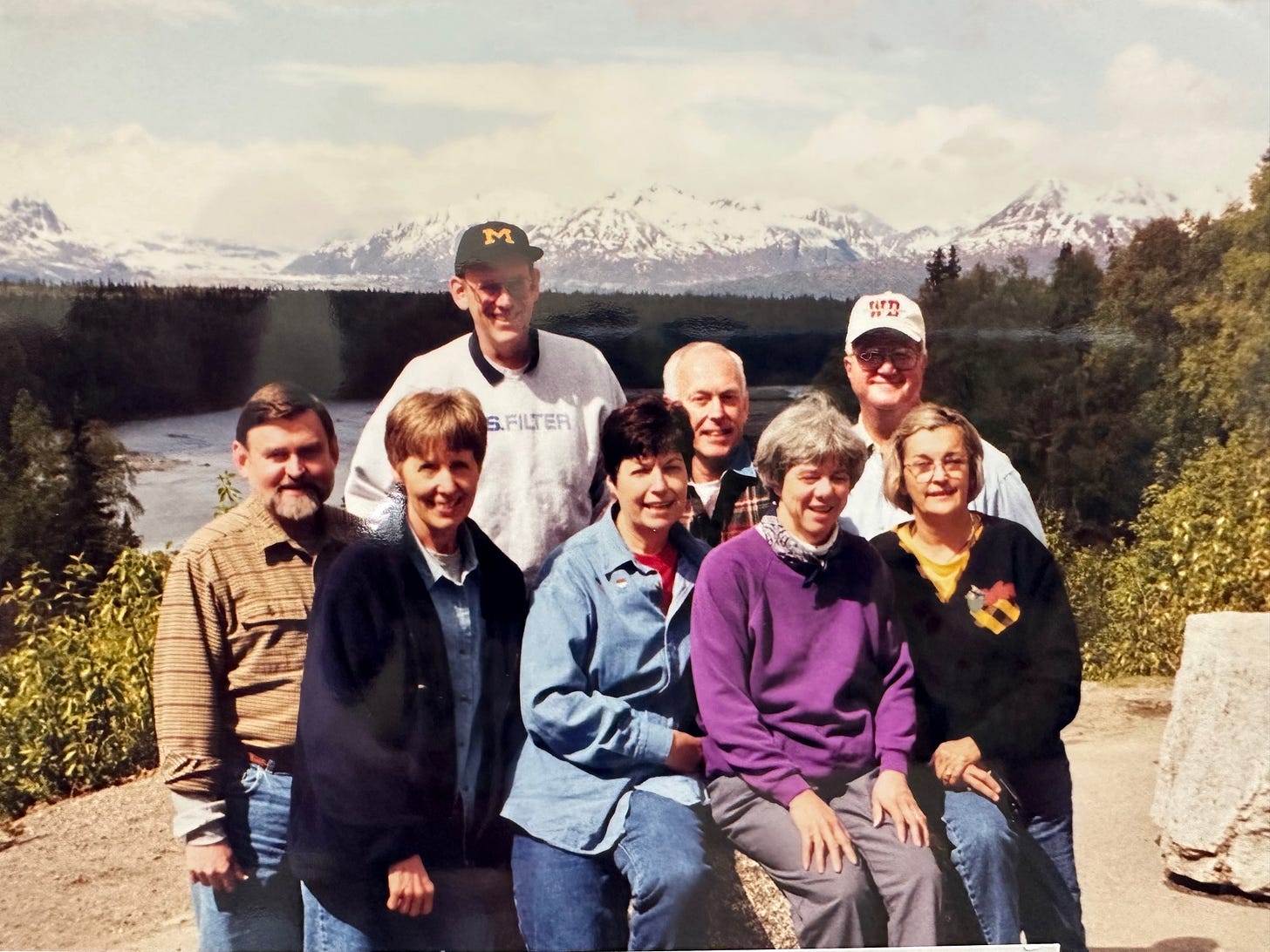
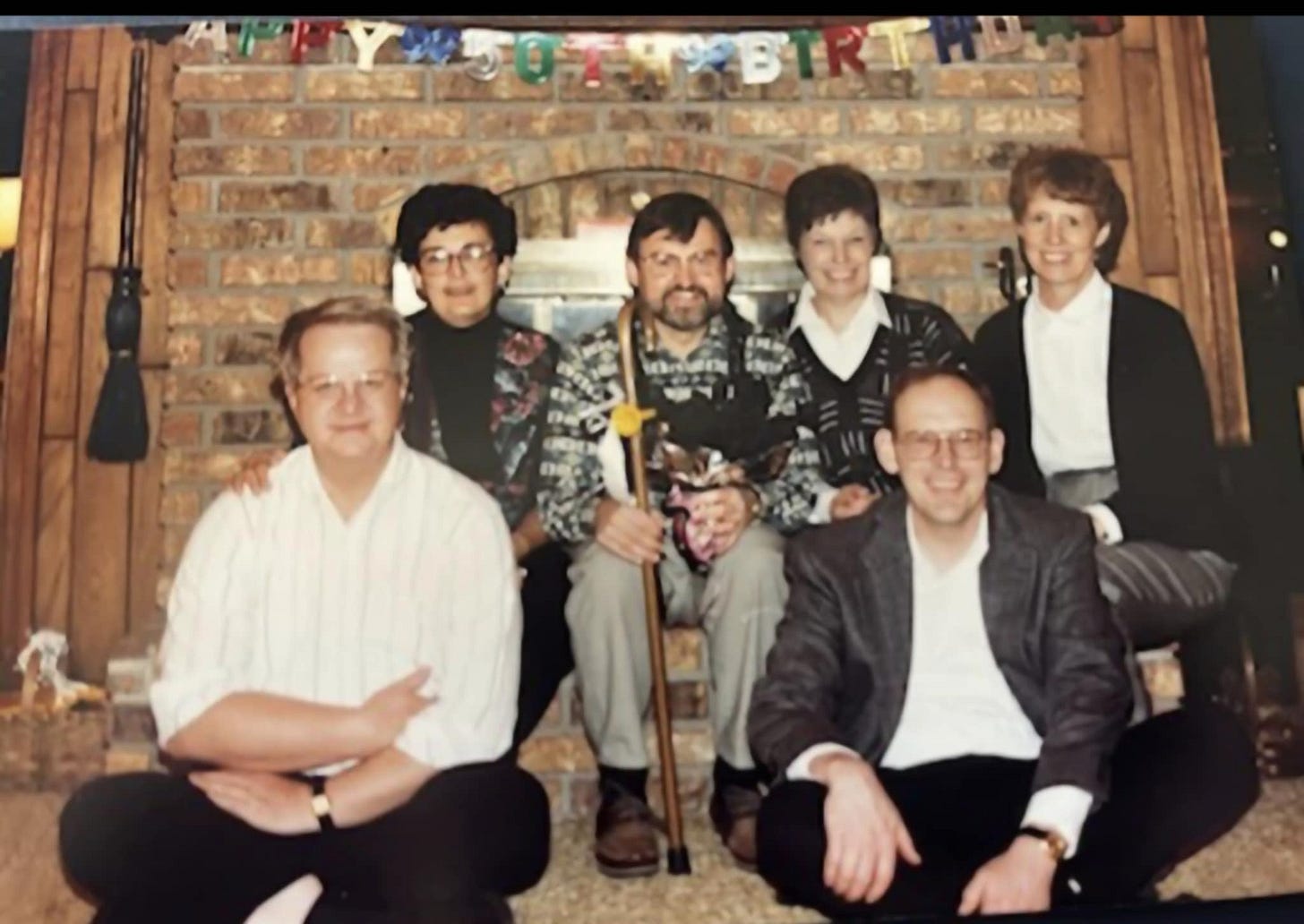
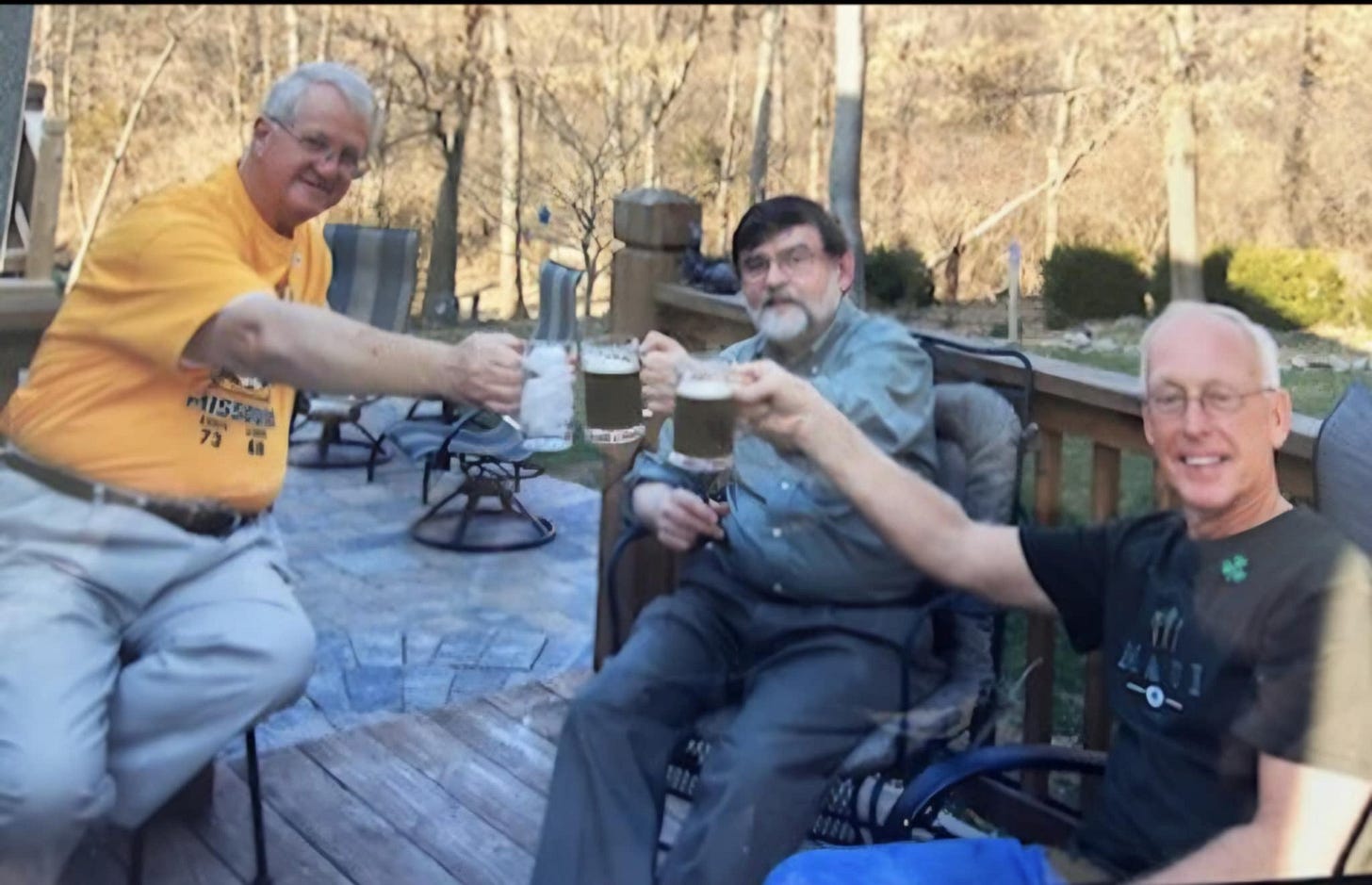
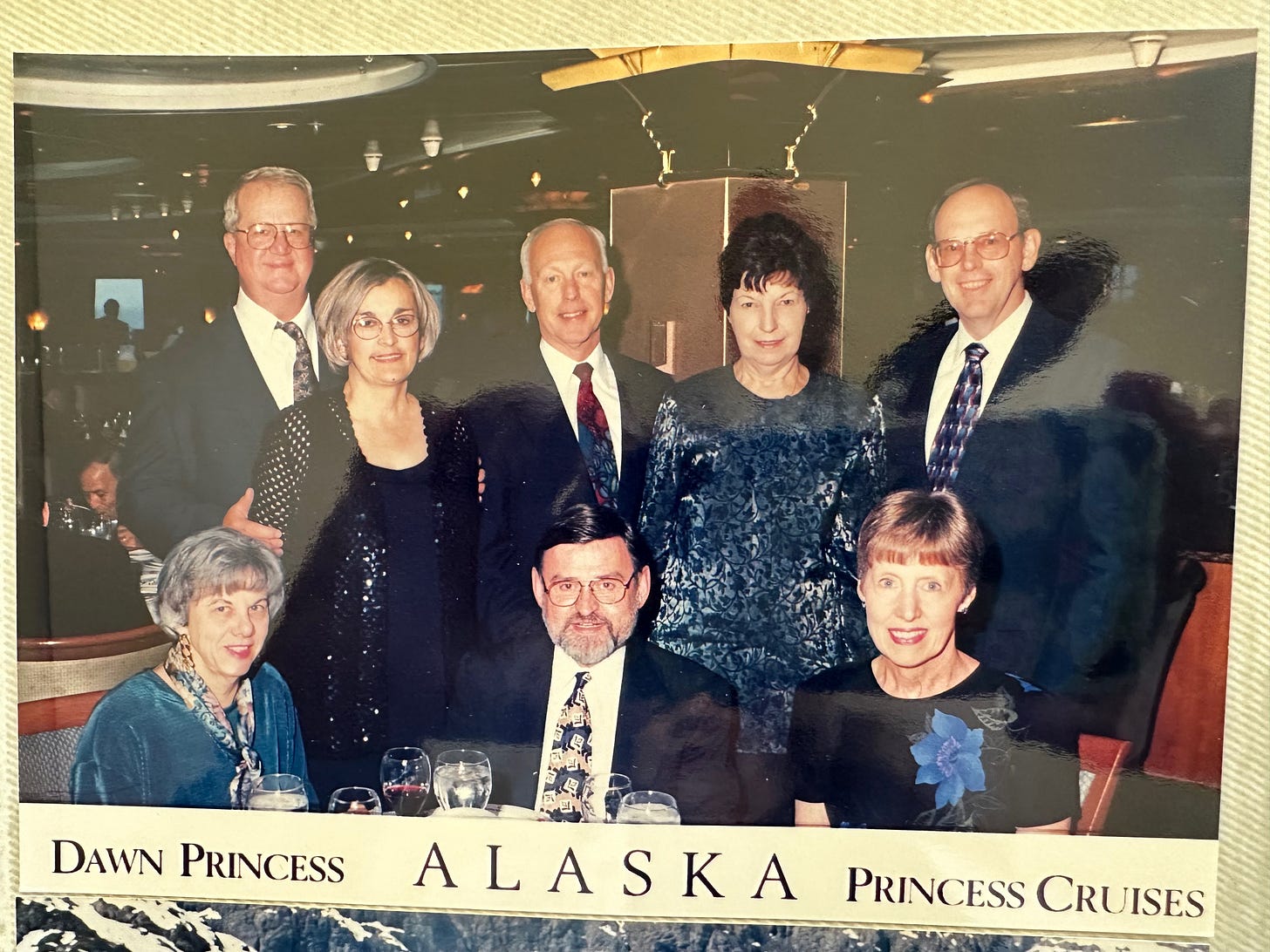
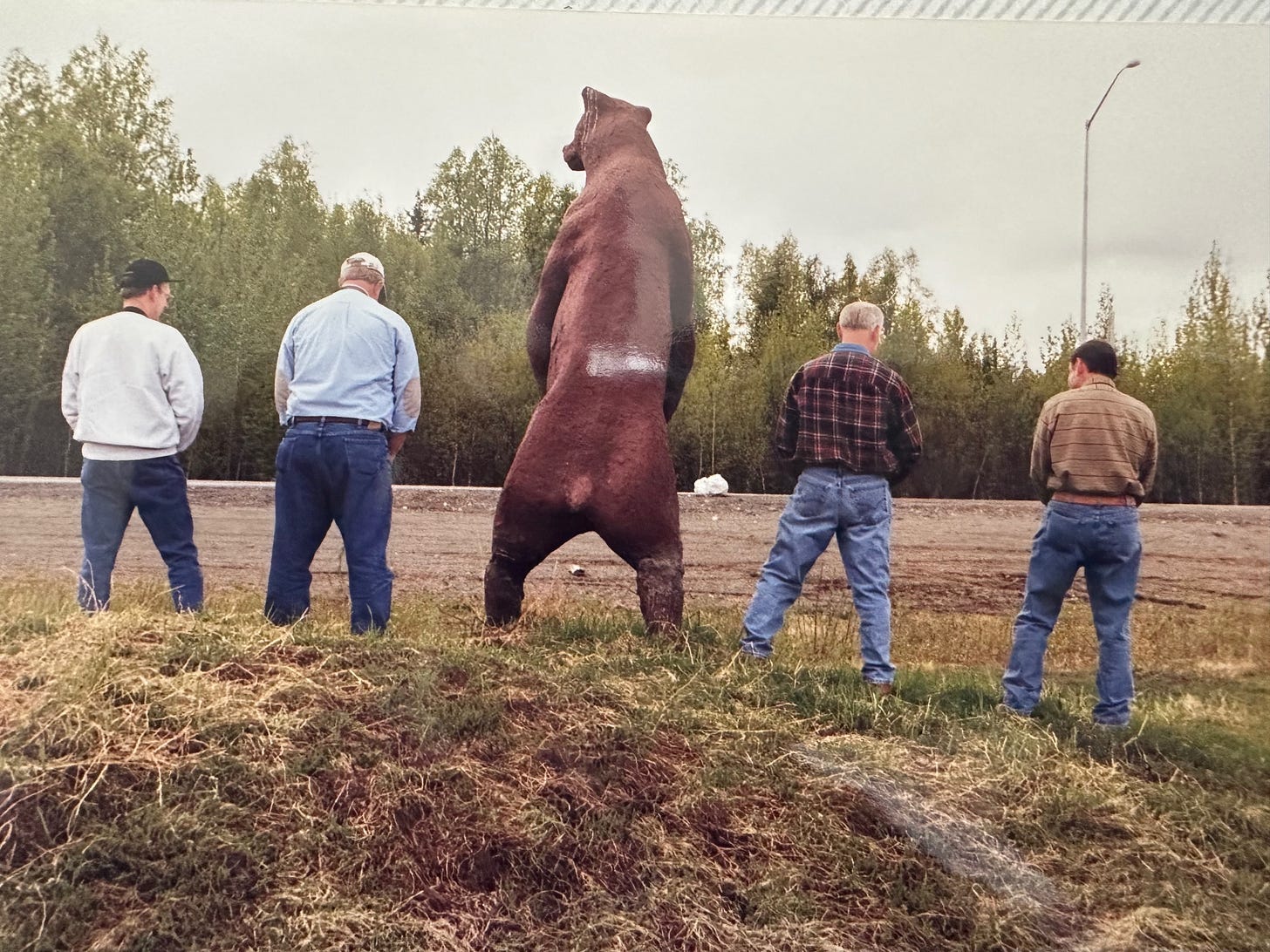
Pastor Pete, I've been thinking about you a lot lately, and this memory of yours is especially poignant right now. Not just because it makes me think of Terry, but also because just a couple of weeks ago I lost my best friend from high school, who also had Parkinson’s. Fortunately I was able to travel to Gardiner, MT last September to reconnect with her. She had been diagnosed about 4 years prior, but when I was there, you couldn’t tell anything was wrong with her. Well, in December she got the diagnosis if Lewy Body Dementia, and on January 16 the doctor told her that it was progressing much faster than they had anticipated, and that there was nothing they could do. Her husband called me a few days later and said that she wasn't doing very well, falling a lot, hallucinations, problems with speech and swallowing. He thought she had maybe 2 months at the most, but I was still in denial. I called her daughter and asked her to check their April calendar to see if there would be a time i could come see her again. Her daughter said, to be honest, I don't think she'll make it till April. So I dropped everything and went the next week. When I got there, she was mostly sleeping, but she did wake up to recognize me, and I actually got a picture of the two of us. I came home on February 22, and she passed away February 23 at 12:15 am. So I barely made it in time to tell her goodbye and that I loved her.
So all this to say, as you alluded to, all of those remembrances of loss and sadness have been bubbling up again for me. It's bittersweet to have all those memories come back. And I feel your pain.
Other than that, I hope you are doing well. I certainly reflect often on the time that we had together at Our Savior.
Blessings!
Cindra
Thank you for sharing your experience with how life goes on, even though we, as your friend is doing now, can hardly breathe. After MaryAnn died, I remember in your writings how you made that decision that you were going to live - and what a life you've lived since then!!